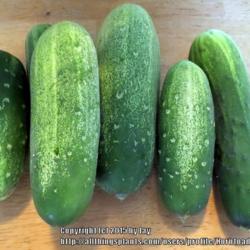
Cucumbers are the quintessential summer crop. The crisp, juicy fruits are great sliced in salads, used raw in dips, or just eaten out of your hand with a little salt and pepper. However, gardeners may have noticed that some years you get so many fruits you're giving them away, while other years production is limited by insects, disease, and unfavorable weather.
If you're tired of battling pests and the weather while only getting a spotty crop, try these troubleshooting tips.
Poor PollinationLike all vegetables in the Cucurbitacea family (squash, pumpkins, melons, gourds), cucumbers produce separate male and female flowers on each plant. In order to get fruit, bees and other pollinating insects need to visit the flowers. But if the weather is too cloudy or cold, the bees don't fly and your flowers don't get pollinated. Also, there has been a dramatic population decline in the number of bees and other pollinating insects due to diseases and predatory insects, so the chances of them finding your cucumber flowers is reduced.
Some cucumber varieties have been bred to produce all-female plants (called "gynecious"), which have mostly female flowers. This increases the chance that the plants will produce fruit. Each packet of all-female cucumbers comes with a male pollinator variety that needs to be planted, too, to insure proper pollination. Some good gynecious varieties to grow include:
'Slice Master Hybrid' - This early-maturing slicer produces heavy yields in spite of the weather.
'Orient Express Hybrid' - This variety produces nonbitter, slicing, 14-inch-long fruits with good "crunch" and disease tolerance.
'Olympian Hybrid' - This early-maturing slicer has great disease resistance, making it widely adapted.
But the all-female plants still depend on bees and pollination to yield fruit. So to reduce the need for pollinators, breeders have also created parthenocarpic varieties, which produce plants with all female flowers that are self-fertile, meaning they don't need pollination to produce fruit. While many need to be grown in a greenhouse to produce the best quality fruit, there are some new varieties that can be grown in the home garden as well. Here are a few of them:
'Diva Hybrid' - This variety is an All-America Selections winner that produces sweet, nonbitter, crisp-textured 4- to 5-inch-long slicing cucumbers. The plants are resistant to scab and tolerant of powdery and downy mildews.
'Tyria Hybrid' - This Dutch greenhouse variety grows equally well indoors and outdoors. The 14-inch-long, lightly ribbed, dark green fruits are nonbitter.
InsectsCucumber beetles are the most destructive pests of cucumbers. These 1/2-inch-long, black and yellow beetles are either striped or spotted. They not only feed on young cucumber seedlings and flowers, they also transmit wilt disease between plants. Their feeding can deform plants and fruits.
To control cucumber beetles, cover young plants with a floating row cover. This lightweight, cheesecloth-like fabric excludes most of the beetles from the plants. Periodically check under the plants for any beetles that have snuck inside. Cucumber beetles are also attracted to the color yellow, so you can place yellow cards covered with a sticky substance such as Tanglefoot to catch and kill the beetles. Sprays, such as neem oil and pyrethrum, can also be effective in controlling this pest.
Squash bugs are brown or gray, 1/2-inch-long bugs that attack the leaves, sucking the plant juices and deforming the plant. They are often found congregated on the undersides of leaves. While more of a problem on squashes and melons, they can attack cucumbers as well. To control squash bugs, crush the bronze-colored eggs on the undersides of the leaves and spray the young and adults with pyrethrum.
Aphids often feed on new leaves and can be controlled with a jet spray of water. Pickleworms tunnel into developing fruits, causing them to rot. Use floating row covers to protect young fruit on parthenocarpic varieties, and spray pyrethrum on other cucumber varieties.
DiseasesThere are a number of diseases that affect cucumbers. Luckily, many varieties are disease tolerant or resistant. Tolerance means the plant can get the disease but it won't kill it or affect yield. Resistance means the plant is protected against getting the disease.
There are some varieties that have excellent disease tolerance/resistance. 'Eureka' has great disease tolerance to angular leaf spot, scab, watermelon mosaic, zucchini yellows, cucumber mosaic virus, anthracnose races 1 & 2, and powdery mildew. 'Slice Master' tolerates scab, cucumber mosaic virus, anthracnose, downy and powdery mildew, and angular leaf spot. 'Olympian Hybrid' tolerates scab, angular leaf spot, and downy and powdery mildew.
Clean up plant debris in fall, space the plants properly, mulch, and keep plants healthy with water and fertilizer to prevent diseases on your cucumbers.
QUESTION OF THE WEEKRemoving Tomato Suckers
Q: I'm getting ready to stake my tomato plants. Should I remove the suckers and how do I do it?
A: If your plant is an indeterminate variety (continues to grow and produce fruit until frost), then removing suckers is a good idea to limit plant growth to a manageable size and mature the fruit sooner. If you're growing a dwarf or determinate variety, then it is not as important.
Suckers are side shoots that grow from the node where a leaf attaches to the tomato vine. Removing the suckers encourages earlier and larger tomatoes. It also improves the flavor by keeping the number of fruits lower in relation to foliage. You can remove all the suckers as they develop or let the first three suckers develop, then pinch off all the rest. Most likely the first suckers will have time to grow and mature fruit before a frost, while the later suckers won't. To remove suckers, pinch the shoots when they are 3 to 4 inches long.
 Charlie Nardozzi is an award winning, nationally recognized garden writer, speaker, radio, and television personality. He has worked for more than 30 years bringing expert gardening information to home gardeners through radio, television, talks, tours, on-line, and the printed page. Charlie delights in making gardening information simple, easy, fun and accessible to everyone. He's the author of 6 books, has three radio shows in New England and a TV show. He leads Garden Tours around the world and consults with organizations and companies about gardening programs. See more about him at Gardening With Charlie.
Charlie Nardozzi is an award winning, nationally recognized garden writer, speaker, radio, and television personality. He has worked for more than 30 years bringing expert gardening information to home gardeners through radio, television, talks, tours, on-line, and the printed page. Charlie delights in making gardening information simple, easy, fun and accessible to everyone. He's the author of 6 books, has three radio shows in New England and a TV show. He leads Garden Tours around the world and consults with organizations and companies about gardening programs. See more about him at Gardening With Charlie.
 Victory Seed Company has all the seeds you want for your best garden in 2024.
Victory Seed Company has all the seeds you want for your best garden in 2024.
For 25 years, the family-owned Victory Seed Company has provided the highest quality vegetable, herb and flower seeds to families across the country. We are passionate about providing you the best seeds available that give excellent germination, robust plants, and the harvest you want. With a catalog of over a thousand varieties, we have everything, and our prices are the kinds that we'd want to pay. We have hundreds of yesterday's heirloom vegetables, as well as today's award winning hybrid selections. Get to know us by visiting our website and browsing through our online vegetable seed catalog.